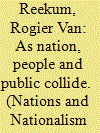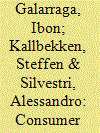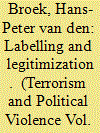| Srl | Item |
| 1 |
ID:
115225


|
|
|
|
|
| Publication |
2012.
|
| Summary/Abstract |
In recent decades, Dutchness has become an intensely debated issue in Dutch public sphere. The article problematises the labelling of nations and nationalisms that occurs in public and academic understandings of these developments. Craig Calhoun's concept of discursive formation is argued to be more fruitful for understanding the recent contestations over Dutchness. Yet Calhoun's theory is itself in need of elaboration. Whereas Calhoun proposes to focus on the extent to which nations are constructed as publics of highly differentiated members, it is precisely this image that is central to an exclusionary discourse of Dutchness and enables the exclusion of cultural others from the Dutch imaginary. By analysing the enactment of Dutchness through discourses on citizenship, the surprising congruence of pluralism and exclusion in the Dutch context is explored.
|
|
|
|
|
|
|
|
|
|
|
|
|
|
|
|
| 2 |
ID:
171424


|
|
|
|
|
| Summary/Abstract |
Improved energy efficiency can help reduce pollution, contribute to energy security, and help consumers save money. This paper explores energy labelling schemes as a policy instrument for promoting energy-efficient cars in Spain. Specifically, it explores consumer responses to changes in vehicle prices. We derive the demand responses for two different efficiency labelling schemes: absolute and relative. To that end, we calculate own- and cross-price elasticities of demand for cars with efficiency labels on the Spanish car market. The results show that the elasticities for more efficient cars are in general higher. However, in the specific case of sedans, the elasticities depend on assumptions about how consumers decide which car to purchase. If consumers are concerned about the absolute energy performance of cars independently of other attributes, and thus pay attention to absolute labelling, demand for more efficient cars is more elastic than demand for less efficient cars. If consumers choose the car segment first and then the energy performance, using the relative label, the opposite result is found. The results suggest that both relative and absolute labelling schemes can be useful, depending on how consumers make their decisions. It might also be possible to design a mixed system.
|
|
|
|
|
|
|
|
|
|
|
|
|
|
|
|
| 3 |
ID:
152865


|
|
|
|
|
| Summary/Abstract |
This article focuses on the role of labelling in the discourse employed by the Left-Wing Nationalist movement in the Basque Country to legitimize the use of violence for political ends. The approach in this article goes beyond classic labelling theory. I demonstrate that radical Nationalists do not passively undergo their being labelled as deviants (fanatics, terrorists) by society, but develop counter-labels instead to define their opponents and re-label themselves.
|
|
|
|
|
|
|
|
|
|
|
|
|
|
|
|